#Simonides
Text
“The Mousai are always dancing, and the goddesses love to busy themselves with songs and strings. But when they see Apollon beginning to lead the dance, they put their heart into their singing even more than before and send down from Helikon an all-harmonious sound.”
- Simonides, Fragment 578 (from Himerius, Orations)
#apollon#apollo#muses#mousai#calliope#terpsichore#clio#urania#polyhymnia#euterpe#thalia#melpomene#erato#greek gods#Simonides#Himerius
61 notes
·
View notes
Text
I feel like Sappho is probably going to come out on top here but I'm curious what everyone's Poetry Hot Takes are
#poetry#lyric poetry#classics#tagamemnon#alcman#sappho#alcaeus#anacreon#stesichorus#ibycus#simonides#baccylides#pindar#greek poetry#poll
127 notes
·
View notes
Text
Fallen in Their Prime
Anthologia Planudea 26 = Simonides
Note: This epitaph commemorates the Athenians killed during a victory over the Euboean city of Chalcis in 504 BCE. Dirphys is a mountain on Euboea; Euripus is the strait separating Attica and Euboea.
Beneath the fold of Dirphys we were slain; a mound
At public cost was poured on us near Euripus,
Not unjustly: for we lost our lovely youth
When we received the gritty cloud of war.
Δίρφυος ἐδμήθημεν ὑπὸ πτυχί: σῆμα δ᾽ ἐφ᾽ ἡμῖν
ἐγγύθεν Εὐρίπου δημοσίᾳ κέχυται,
οὐκ ἀδίκως: ἐρατὴν γὰρ ἀπωλέσαμεν νεότητα,
τρηχεῖαν πολέμου δεξάμενοι νεφέλην.
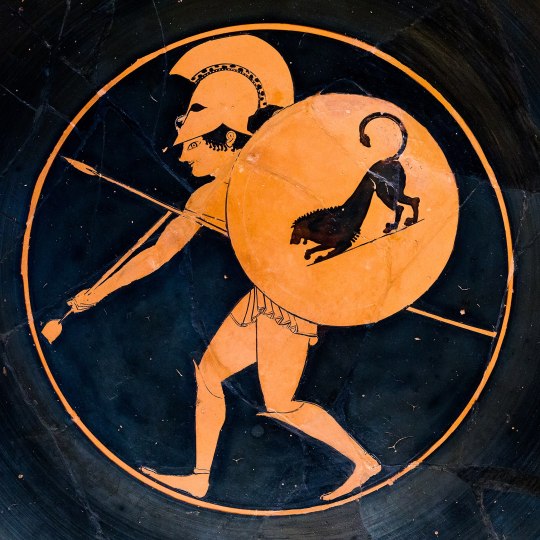
A hoplite with lion shield and trumpet. Interior of an Attic red-figure kylix (drinking cup), made by the potter Euxitheos and painter Oltos ca. 515-510 BCE. From Vulci; now in the Altes Museum, Berlin. Photo credit: ArchaiOptix/Wikimedia Commons.
#classics#tagamemnon#Ancient Greece#Archaic Greece#ancient history#Greek history#Ancient Greek history#Greek#Greek language#Ancient Greek#Ancient Greek language#translation#Greek translation#Ancient Greek translation#langblr#poem#poetry#poetry in translation#Simonides#epigram#epitaph#elegiac couplets#Anthologia Graeca#Greek Anthology#Anthologia Planudea#Planudean Anthology
72 notes
·
View notes
Text

🥺😭 Danae needs a hug.
#greek mythology#ancient greek mythology#greek pantheon#Danae#zeus#Perseus#Simonides of Keos#Simonides
4 notes
·
View notes
Text
Praise poetry addresses itself to an individual who has chosen to test the limits of human possibility and momentarily succeeded. (Anne Carson, “Economy of the Unlost”)
4 notes
·
View notes
Text
Money is something visible and invisible at the same time. A "real abstraction," in Marx's terms. You can hold a coin in your hand and yet not touch its value. That which makes this thing "money" is not what you see.
When the ancient Greeks talk of money, adjectives for "visible" and "invisible" occur inconsistently. Money can be found categorized as "invisible" when contrasted with real estate, for example; as "visible" when it means a bank deposit that is part of an inheritance. Modern scholars have been unsuccessful in efforts to abstract a stable definition for these terms from ancient usage.
In the view of the anthropologist Louis Gernet, the confusion represents a "flawed category" created by the Greeks when they tried to fit the many nuances of moneyed situations into a binary terminology. "The problem is, thought moves in many directions."
Money also moves in many directions. Simonides, we know, had occasion to observe these movements and to meditate on their relation to the phenomena of perception.
He lived at an interface between two economic systems. His texts and testimonia make clear that he gave thought to the concepts of visible and invisible, was aware of a turmoil in their categorization and had an interest (conditioned perhaps by economic experience) in their valuing.
This interest shows up especially in his statements about what poetry is and how it works. He seems to believe that the visible and invisible worlds lie side by side--
Economy of the Unlost, Anne Carson
6 notes
·
View notes
Photo

"Digam aos espartanos, estranhos que passam, que aqui, obedientes às suas leis, jazemos." (Simônides) "Itt nyugszunk. Vándor, vidd hírül a spártaiaknak: Megcselekedtük, amit megkövetelt a haza." (Szimonidész) "Stranger, bear this message to the Spartans, that we lie here obedient to their laws." (Simonides) „Ὦ ξεῖν', ἀγγέλλειν Λακεδαιμονίοις ὅτι τῇδε κείμεθα, τοῖς κείνων ῥήμασι πειθόμενοι.” (Σιμωνίδης) #roller #rolo #bird #Simônides #Simonides #Σιμωνίδης #epigrama #faszerhagyodszet #perdidoemLisboa #dream_dealer_lisboa #sociofoto #szociofotó (helyszín: Cais Do Sodré) https://www.instagram.com/p/Ci5bNkXIq6W/?igshid=NGJjMDIxMWI=
#roller#rolo#bird#simônides#simonides#σιμωνίδης#epigrama#faszerthagyodszet#perdidoemlisboa#dream_dealer_lisboa#sociofoto#szociofotó
4 notes
·
View notes
Text
It is just to give each what is owed.
Simonides
2 notes
·
View notes
Text
Tenemos todo el tiempo para estar muertos, y a pesar de esto que mal vivimos nuestra breve Vida, la entregamos a los vicios, a las malas amistades, a las expectativas ajenas y no hay quienes puedan devolvernos los años, Quizá sea momento de reevaluar las cosas que se llevan nuestro tiempo.
0 notes
Text
The Praise Singer by Mary Renault [A Review]
New Review: The Praise Singer by Mary Renault
The Praise Singer is Mary Renault’s telling of the life story of the ancient Greek poet Simonides. Living at a time of Persian expansion, Greek Tyrants and the spread of writing, Renault shows Simonides navigating this world informed with her trademark deep knowledge of ancient Greece.
At his home on Sicily, Simonides of Ceos has time to reflect on his life and travels. At 83 years old, he has…

View On WordPress
1 note
·
View note
Text
Poema loquens pictura est, pictura tacitum poema debet esse.
(Ein Gedicht ist ein sprechendes Gemälde, ein Gemälde soll ein stummes Gedicht sein.)
Dem griechischen Lyriker Simonides von Keos (um 556 v. Chr. – um 468 v. Chr.) zugeschriebene und beim Auctor ad Herennium sowie von Plutarch überlieferte Wendung.
1 note
·
View note
Text
Per i morti alle Termopili
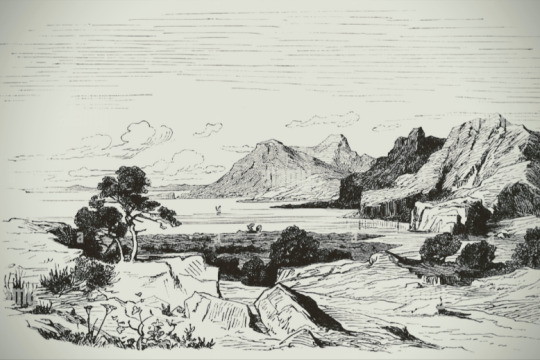
Di quelli che giacquero alle Termopili
gloriosa e bella è la sorte:
la loro tomba è un'ara, una memoria degli avi;
la loro morte è un elogio.
Una tale iscrizione né il muschio,
né il tempo distruttore
mai la cancellerà: è l'epitaffio de' bravi.
Quel sepolcro racchiude
la gloria degli abitanti della Grecia.
Testimone Leonida, il re di Sparta,
che ha lasciato un grande monumento di virtù,
una gloria eterna.
(Simonide)
[Non mi è mai importato nulla delle battaglie né sono mai stata sensibile al cosiddetto valor militare; ma sempre mi è piaciuta questa poesia (forse, un frammento?), perché, essendo sensibili alla poesia, si palpita, attraverso di essa, anche per ciò su cui, nella prosa della realtà, non si poserebbe lo sguardo.]
2 notes
·
View notes
Text
Memento Mori for a Monday
Anthologia Palatina 10.105 = Simonides
A certain Theodorus takes delight because
I’ve died. Some other man in turn will take delight
At his demise. We all are debts owed to Death.
χαίρει τις Θεόδωρος, ἐπεὶ θάνον· ἄλλος ἐπ᾽ αὐτῷ
χαιρήσει. θανάτῳ πάντες ὀφειλόμεθα.

Vanitas, Harmen Steenwijck, ca. 1640
#classics#tagamemnon#Greek#Ancient Greek#Greek language#Ancient Greek language#translation#Greek translation#Ancient Greek translation#poem#poetry#poetry in translation#Ancient Greece#Classical Greece#Simonides#epigram#couplet#elegiac couplets#Anthologia Palatina#Palatine Anthology#Anthologia Graeca#Greek Anthology#Harmen Steenwijck
57 notes
·
View notes
Text
summer of mary renault… part 2
#last summer I read the Theseus books#now at the recommendation of a friend I’m planning on reading the mask of Apollo and the Simonides book#I inch ever closer to her Alexander books but that’s for another year I think#mine
9 notes
·
View notes
Text
Day 6: Pirates & Mermaids [TurGre]
My fourth entry for @hwsrarepairweek2022! A Pirate's Life is for ... not Herakles, who'd much rather hang out with his local rat catchers than rats on the corsair ship.
Ship: Turkey/Greece (Sadık Adnan/Herakles Karpuzi)
Set in a Human/Historical AU (The Mediterrenean between 1480 to 1570)
Please consult ao3 for a full overview of tropes, topics & disclaimers in the tags
Read it here on ao3
Herakles & Sadık talk a lot about three human OCs of mine in here - all of which the lovely @captkirkland has drawn for me! [Original Post]

(Left to right: Timothea, Herakles, Omar)
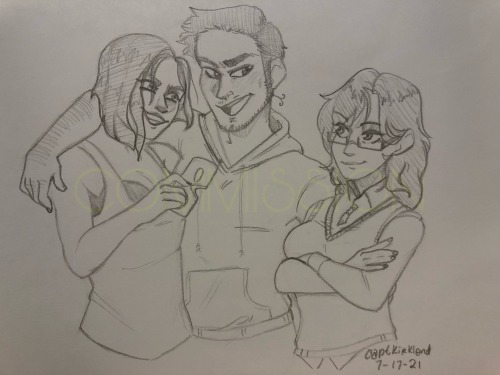
(Left to right: Dilan, Sadık, Havva) (I'll still have to find a way to integrate Havva into this AU, but I'd love to.)
A few big disclaimers before we get started on this:
I sadly did not have the time to delve deeply into the academic archives of the internet to find any papers on Gender, more importantly Gender presentation, Gender construction and Gender deviance in the Ottoman Empire. I'm sure that scholarships on these topics exist and I'll add further readings for you once I find it. Please do not assume any accuracy when it comes to the topic of being transgender in the times & places this is set (The Ottoman Empire around 1480 to 1570). I've tried to the best of my abilities, but that is still based on assumptions and educated guesses. I tried to avoid any hurtful language or phrasing when it comes to the two trans characters (Dilan & Omar), but I'm open to criticism if I said something ignorant.
A lot of this has been influenced by my class "Travel accounts in the Late Medieval Ages." While it deals with the accounts of German pilgrims travelling to Jerusalem and sometimes beyond, I'm confident that many of its aspects can reliably inform the scenario of this One Shot. One of them is certainly the aspect of slavery, which was a common and widely spread occurence all throughout the mediterranean at this time, from Genua to Alexandria.
The main source for Ottoman Corsairs & the Ottoman Navy around this time I could get my hands on was "Die Seeaktivitäten der muslimischen Beutefahrer als Bestandteil der staatlichen Flotte während der osmanischen Expansion im Mittelmeer im 15. und 16. Jahrhundert" by Andreas Rieger, published in Berlin, 1994. However, as solid as I assume the work to be in many regards, it's nearly 30 years old and is heavily slanted towards european sources.
I also used the International Encyclopaedia for the Middle Ages here and there to look up certain things, such as seals.
For the snippets of the Odyssey that Herakles reads, I used Samuel Butler's translation, which is freely available online here!. There are much more modern, and perhaps much more engaging translations of the Odyssey available, if you want to seek the text out for yourself - But this one's online and for free. Most importantly, free for me to copy & save some time.
She's the only one I want, she's my only wish
„That does not look like the letter to the Sancakbey I asked you to write.”
Herakles startled before he froze. He didn’t know how Sadık had managed to enter the captain’s quarters without making a sound. Everything on the ship made sounds, day and night, loud and banging. Sadık was a loud and booming man.
“The letter is over there.” Herakles pointed to a stack of papers on the left end of the low table. He had lowered his head again. “It only needs your approval and seal.”
Sadık did not demand that he turned to look at him. “Why didn’t you tell me that you were done?”
Herakles had become aware of how close he stood behind him. He continued to look at the book in front of him, though he could barely process the words. “I thought it better not to interrupt your prayer, Sir.”
“I finished my prayer a while ago.” Sadık let the words linger, long enough to become uncomfortable, not long enough for Herakles to come up with a reply. In measured steps, he walked around the table and sat down on its other side.
Herakles kept his head down. On the periphery of his vision he saw how picked up the paper. His seal ring was like his hands, weathered and sturdy, but of a beautiful form and a curious intricacy.
By the time that Sadık sealed the letter, Herakles had become engrossed in his readings again. The rustle of paper joined the same background noise as the waves outside and the crew on the ship.
“What is this?”
For the first time, Herakles looked up. Sadık had picked up another letter from the pile. The paper bent to its own weight enough that Herakles could see the writing.
It was in Greek letters.
He stared at the letter before he dared to look Sadık. He didn’t even wear a veil in front of his mouth; Herakles was met with an inquisitive and yet unnervingly shallow look in the brown eyes and an expressionless mouth.
“ … It’s a letter for Natasa,” Herakles admitted and held his gaze.
Sadık broke it and put the letter down. “I see. What is your plan for getting it to Athens?”
“I’ll see to it.”
“Do you have the money for it?”
Herakles tried to ignore the implicit taunt. “There must be some kind soul left on this earth, who’ll put the ease of a worried mother over the weight of their money purse.” Said as if he would believe it.
Sadık snorted. “Well, I should hope you find such an elusive and fantastical creature. Did that book of yours also fall from the skies into your lap that you believe in such miracles?”
Herakles no longer kept the edge out of his voice. He looked at Sadık. “You are prying. And I’d like the illusion that I am not here as a slave that owes you an answer in such private matters, but as a scribe and part of the crew.”
“Well, slaves are part of the crew.” His tone turned from nonchalant to boastful. “And regardless of free or not, Christian or Muslim, Turk or not, anyone on this ship has to answer to me.” A smirk to match had grown onto his face, but now it dimmed. “That was the deal for being signed on and yours is not a special one in that regard.”
Herakles would have returned the letter to Athens himself and then locked himself into his study for all eternity, lest he’d run the risk of ever meeting someone like Sadık again. But his own emotional well-being was of no concern as long as he worried about the lives of his friends Timothea and Omar. “Slaves also get their fair share of loot, so you could have a lot more pretty books, if you wanted to.” Sadık tapped on the open page and Herakles hands cramped while he swallowed his anger.
“I’ll take the illusion of freedom.” His voice was level, as was his look for Sadık, despite the amused twinkle he found in the other’s eyes. “For how long will we be at anchor here?”
“All winter, if things go badly.” Herakles’ expression slipped as he stared at him. “But I hope as much as you do that we can go for one last run. Perhaps catch some Venetian or Genovese stragglers before the winter sets in – Those Venetians have become awfully bold, anyways.” Sadık carefully set aside the letter to Natasa and took the rest of the documents to peruse. “But we’re actually headed for the Spaniards in Sicily.”
“Sicily … Yes, that is a good place …” Herakles was absentminded. He hadn’t seen Michele in many years, but knew that as owner of an inn, he’d have news of who passed through the Mediterranean.
“You’ll only get your loot if you stay for the winter.” Sadık had not lifted his look from the papers.
“I was not going to part ways until I found the twins. Have you any news of your friend?”
Sadık smiled faintly and Herakles did the same, until he realized it. “No, but we’ll sail along a few ports well-disposed towards us, among them the port where Dilan left the ship.” The smile disappeared. “I’m worried for her – Her fate may be the same as the one of your twins.”
Herakles tried not to think of all the possible fates implied, one worse than the other.
“Well, if neither of us knows about the whereabouts of either of our companions, perhaps they’ve met up,” Herakles said. “Your friend is the whole reason why Omar left, and his sister with him.”
“I thought the same. And it’d save us some trouble, if we found them at the same time, wouldn’t it?” Sadık said and glanced at him from the side with a smile that was somewhere between heart-warming and roguish.
“And it is safer for anyone to travel in a group. Even better, either party could vouch for the other if they run into troubles with Christians or Muslims along the way. The twins know their way around people.”
“What do you mean by that?” Herakles thought about how to phrase the twins' gift of adapting to situations as they arose and the characters around them. “That they can vouch for each other?”
His heart slowed down, but didn’t sink completely into his guts. He had told Sadık that the Simonides family were converted Muslims - The Greek Natasa had married a trader from Tunis called Ibrahim and converted to Islam. There had been no lie in this story; it was the life they lived in front of everyone. No one ought to know that Natasa’s conversion had been rather half-heartedly and that the twins had been raised with a knowledge of both religions.
“I’ve known them ever since the three of us were children, you know, and unlike their mother, I did not renounce the Christian faith. Therefore, if they meet another Christian, which could mean trouble for Dilan, they can pretend to be a believer and vouch for her.”
“Blasphemous behaviour.” It was said rather as a statement than a condemnation.
“Perhaps your God and Prophet will allow it, if it is to save a fellow believer from a harsh faith.” Herakles looked away and lowered his eyes. “Though I do not want to speak on matters that do not concern me.” He looked back at Sadık. “I can only speak for their parents, who’d much rather have them back with sin than a martyr.”
“I suppose that much is true. Since their actions are none of my concerns, I’d also rather have them do what they have to do to ensure I’ll get my second in command back safe and sound.” Herakles wondered if somebody else on the ship could hear them, but doubted it. “They owe it to me, in a way. After they used their wiles to ensnare her and led her away from me in the first place.”
Herakles’ lips twitched into a smile as he snorted. A smirk flitted across Sadık’s face, but he didn’t look up from the document that he held in front of him.
Herakles returned to his reading.
'Come here,' they sang, 'renowned Ulysses, honour to the Achaean name, and listen to our two voices…
“If Dilan had any brains left, and she is with the twins, she would have already married Timothea.”
Herakles jolted up. A deep furrow between his brows and his jaw slack, he could muster a “... Huh?” as reply.
Sadık lowered the document and glanced at Herakles, undisturbed by his stare. “It would make sense, if she wanted to keep them safe abroad, travelling within the empire.”
“My apologies, Sir, but I fail to see the sense in marrying your lover’s sister.”
Sadık put the document down. “You’ve heard how the rest of the crew talks about her.”
They would not say her, for a start. “I do.”
Sadık crossed his arms, but soon unfolded them again to gesture. “Well, if she acts on land as she does on the ship, people will recognize her as a man. Which does mean that she wouldn’t be able to marry Omar, but she would be able to marry his sister, which I think would do them better when it comes to fending for themselves in the Empire. There’d be no doubt about the twins' faith and origin that way.”
Sadık had said that he had seen the twins before, or at least Omar, but only from afar or fleetingly. And evidently, Dilan hadn’t told him about how she could have easily married Omar, if one applied Sadık’s logic about her gender to him. Perhaps Omar had even run away to elope with her, with him as wife and her as husband. Although, with the penchant his sister had for women, she perhaps wouldn’t have objected to Sadık’s plan either.
“You’ve understood, Herakles?”
Herakles blinked rapidly. “Yes, yes I have. I see your point now.”
Sadık nodded. “Good.”
“She did behave very much like a man on this ship, the brief time that I knew her.” A scowl crept onto Sadık’s face and Herakles added: “So I think she probably already had the same idea as you, she’d know it would work.”
The scowl disappeared. “She is very practical about such matters. She long preferred women’s garments and women’s ways, but then the sea called and it was easier to be a man out in this world. Well, to act like one.”
“I saw she still wore a veil in a woman’s fashion from time to time.” Herakles rested his cheek on one of his hands. “So she used to live a proper woman’s life?” He lowered his eyes. “If I may ask.”
“You may.” The way he stressed the you confused Herakles. “She did indeed. I have known her since I was a boy. When the time comes where boys turn to men, she instead chose to live as a woman, as she had always wanted. So you must take my word for that she is one, no matter her behaviour and looks, and especially no matter what anybody else says.”
“I would never take anybody else’s word but yours, Captain,” Herakles replied and bit his smile back, to not make Sadık think that he was jesting. The fondness with which he spoke about his friend endeared him to Herakles. It was as if they shared some nebulous connection, some shared life experiences despite leading such starkly different existences.
“Good.” Sadık looked at the book and leant over the table. “What is it that you’re reading?”
Herakles decided to not take the chance and let the friendly tone sour over an evasive answer, though he didn’t know what a truthful one would evoke.
“It’s the Odyssey by Homer.”
It evoked no reaction at all. “What is it about?”
A thousand different answers flitted through his head behind his eyes and Herakles took a deep breath, to give an exhaustive answer to all the ways this question could be answered. However, then he remembered how it would perhaps be wasted on Sadık, as it was to most people that listened to Herakles. Being kicked off a ship far from home was however a much worse fate than being run out of the local tavern.
“The return of Odysseus, king of Ithaka, to said island after the Trojan War and the ten years he spent at sea due to his hubris.” Herakles exhaled all the leftover air with a big sigh.
“No, I meant what is this page you’re reading about,” Sadık replied and Herakles stopped his breath for a second, before he further deflated.
“Oh. It’s about his encounter with the Sirens,” Herakles said and watched Sadık carefully. He yet held back any further remarks about how Odysseus had been warned about them by the enchantress Circe, which of course would warrant an explanation of Circe herself …
“Ah, so it’s about Mermaids,” Sadık said with a smile.
“They’re actually feathered women in this text,” Herakles replied and the smile dropped.
“Huh? Don’t try and pull my leg, I know what the Italians call sirens, I know what you Greeks and everyone else calls sirens. They’re fish women. They’re mermaids.”
“Except they are not in this text.”
“You’re lying to me,” Sadık said. It was a statement.
“I am not!” Herakles insisted.
If anything, it deepened the angry frown on Sadık’s face as his eyes narrowed further. “I get no entertainment out of being fooled.”
“And I get none out of you being a fool.”
Now his eyebrows furrowed hard, but Herakles held his gaze with a stubborn fury. He did not bother with regret in this moment; for if Sadık was already too far gone, grovelling placation would demean them both.
It was the calm before the storm. Sadık was loud, bellowing and imperious. He had seen it in how he treated crew members that contested him. There was no question that Sadık would yell at him before he threw him out of his cabin, only if he’d hit him.
Instead Sadık got up and walked over to the other side of the table, where he sat down next to Herakles. “Read it to me. And you better read it carefully, because you are not the only person who can read Greek on this ship.” As if he spoke to a petulant brat, he repeated: “And I do not appreciate being lied to.”
I doubt the poor souls down at the oars can even look straight ahead anymore, much less read anything, Herakles thought but kept it to himself.
Instead, he put his head down and began to translate the part about the Sirens: “Then, being much troubled in mind, I said to my men, 'My friends, it is not right that one or two of us alone should know the prophecies that Circe has made me, I will therefore tell you about them, so that whether we live or die we may do so with our eyes open. First she said we were to keep clear of the Sirens, who sit and sing most beautifully in a field of flowers; but she said I might hear them myself so long as no one else did. Therefore, take me and bind me to the crosspiece half way up the mast; bind me as I stand upright, with a bond so fast that I cannot possibly break away, and lash the rope's ends to the mast itself. If I beg and pray you to set me free, then bind me more tightly still.”
“Yeah, yeah, just read me the parts about the bird women,” Sadık said and waved his hand.
Herakles closed his eyes so he wouldn’t roll them and exhaled quietly.
“I had hardly finished telling everything to the men before we reached the island of the two Sirens, for the wind had been very favourable.” Herakles went further down the page and the hairs on the back of his neck stood on end when he felt Sadık lean closer to him. “When we had got within earshot of the land, and the ship was going at a good rate, the Sirens saw that we were getting in shore and began with their singing. 'Come here,' they sang, 'renowned Ulysses, honour to the Achaean name, and listen to our two voices. No one ever sailed past us without staying to hear the enchanting sweetness of our song- and he who listens will go on his way not only charmed, but wiser, for we know all the ills that the gods laid upon the Argives and Trojans before Troy, and can tell you everything that is going to happen over the whole world.' They sang these words most musically, and as I longed to hear them further I made by frowning to my men that they should set me free; but they quickened their stroke, and Eurylochus and Perimedes bound me with still stronger bonds till we had got out of hearing of the Sirens' voices. Then my men took the wax from their ears and unbound me.”
Herakles scanned the page further and turned it, but there was no more mention of the Sirens.
“It seems like your claim holds no water,” Sadık said and Herakles furrowed his brows harder in annoyance.
“Perhaps they are described in the warning Circe gives to Odysseus,” Herakles said and turned the pages to find the passage. “First you will come to the Sirens who enchant all who come near them. If any one unwarily draws in too close and hears the singing of the Sirens, his wife and children will never welcome him home again, for they sit in a green field and warble him to death with the sweetness of their song. There is a great heap of dead men's bones lying all around, with the flesh still rotting off them. Therefore pass these Sirens by, and stop your men's ears with wax that none of them may hear; but if you like you can listen yourself, for you may get the men to bind you as you stand upright on a cross-piece half way up the mast, and they must lash the rope's ends to the mast itself, that you may have the pleasure of listening. If you beg and pray the men to unloose you, then they must bind you faster. When your crew have taken you past these Sirens, I cannot give you coherent directions as to which of two courses you are to take; I will lay the two alternatives before you, and you must consider them for yourself.”
The annoyed frown did not subside, but a smirk had stolen itself onto Sadık’s face.
“And, Herakles? Any mentions of birds here? A single feather?”
“Well … no.” Sadık laughed. “But it didn’t say they’re fish either.” The laughter died in his throat. “And other ancient authors, as well as scholars like Eusthatius say –”
“Well, I only care about what this book says,” Sadık tapped the page, “and it says there aren’t any feathered women in here.” He pulled his hand back. “Why would you associate a bird with the sea, anyways?”
Herakles cocked one eyebrow. “You’ve never seen a seagull?”
“Smartass.”
“Let me ask you a question - If they are fish, then why would they be on an island? Fish may be around an island, but not on it.”
“Women may be, though, and they’re only half fish.”
Herakles decided to ignore his point at his own risk. “And did you ever hear a fish sing? Birds do. They sing beautifully.”
“You clearly never heard a seagull.” Herakles opened his mouth to clarify his point, but Sadık wouldn’t let him. “Same answer as before - Fish don’t sing, but women do. Often as beautiful as a nightingale. And they can lure somebody to a nasty fate.”
Herakles didn’t labour the point anymore, for there was no logical argument he could make without the help of other writings.
“I think they sing to Odysseus about knowledge, because that is what he would most desire,” he said instead. He paused for a moment. “In a way, and I mean no offence, but I feel like this is what happened to Omar. That something about Dilan lured him out to sea.”
“She’s not devious like this,” Sadık said with a look of displeasure that Herakles had wanted to avoid.
“I meant not to imply that she is,” he said, softly and in earnest. “Simply that Omar heard a siren call from your ship, with Dilan being clearly the thing he desired the most.”
Sadık held his gaze, but the displeasure faded only slowly.
“Also, I’m the only one who can say that she looks like a bird.” Sadık snickered to himself like a school boy. Herakles frowned in confusion, but it was ignored by Sadık as he carried on with a smile. “I rather think that it was the other way around. That Omar called to her like a siren and lured my second in command away from me, on the dry land and far from home …”
“On the dry land, famously where fish reside.” Herakles couldn’t bite back the jibe, but Sadık didn’t mind.
“Famously where women reside.”
“However. Do not call Omar devious in such a manner either.”
Sadık smiled at him with a curious look. “But in other manners?”
“I said that he and his sister know their way around people, but they wouldn’t run away from home just to play with someone’s heart.”
There was something deeper to Sadık’s gaze now as he smiled at him. Herakles dared not to break the silence, but looked down at his book.
“No, I’m sure they wouldn’t, I’ll take your word for it,” Sadık said. “ … I was thinking more along the lines that there’s a certain allure about you Greeks.”
Sadık scooted closer to Herakles and put an arm around his waist. One of many advances ever since Herakles had begun to travel with him. When he had first asked him for a place on his ship in exchange for his skills, Sadık had taken his chin between his fingers and seized up his face.
Herakles usually resisted them – sometimes he excused himself, stepped away from him or diverted the topic playfully. Sometimes, he harshly reminded Sadık in what capacity he worked on the ship and in which decidedly not or made a bitter quip.
One time he had pushed him so hard that he had fallen. Herakles had run out of the cabin and hid in the room where the ropes were stored. With his heart in his mouth, he had waited to hear him stomp across the ship and cursed himself for his hiding place. Instead, another crew member had found him and told him to help with the sail. The next time he had been alone with Sadık, he had merely told him: “You’re lucky no one saw that. You’ll do that in front of the crew or while we’re on land and I’ll leave you standing – or swimming – in that very spot.” Herakles had acknowledged it and written storage lists in silence.
He looked at the book. He had no chest to store it safely and feared that someone else might mistake it for a religious text and begin an argument over it. Not that he looked forward to sharing a crammed space under deck with a hundred other people, twice the amount of rats and an uncountable one of vermin. Loathed as he was to admit it, his best night’s sleep had probably come by him when he fell asleep at the table in the captain’s cabin.
Sadık’s bedroll, with its plush pillows, looked so much more inviting.
“You know, the sleeping quarters on this ship leave much to be desired.”
Sadık had moved to be able to rest his head on Herakles’ shoulder. He snorted and Herakles felt his breath on his skin. “They do so for all people, that is how it is on a ship. No money could buy you a better one, if you had any. That’s what you signed up for in your selfless mission.”
“Indeed.” Herakles’ eyes were fixed onto the bedroll. Aside from a good night’s sleep, which he missed almost as direly as the local cats, he hadn’t laid with a man or woman in months either. Whenever they made anchor somewhere, Herakles was too afraid to be left behind to visit a brothel.
If one put the fact aside that Sadık was Sadık, a loud, entitled, good-for-nothing corsair oaf, Herakles had little reason to object. He had often watched the ottoman officials in his city, who carried themselves with an air of dignity and gravitas, and hoped no one would notice his longing gazes. He often wondered what the beautiful brown eyes of their wives, if they weren’t from Christian nations, betrayed about the rest of their beauty.
Sadık buried his face in his neck. His beard scratched him. Both of his arms were draped around his waist, but he was almost shy about his touches. Herakles said: “But perhaps I could offer another skill, besides being a scribe and a capable young man …”
Sadık halted. Herakles wondered if he could feel how fast his heart was beating.
He dragged his mouth to Herakles’ ear. “I think your skills of being a capable young man will suit you just fine for a nicer sleeping arrangement.”
Herakles could hear his breath, could hear his own, and gasped when Sadık pressed a wet kiss to his neck.
#hwsrarepairweek2022#Day 6: Pirates and Mermaids#aph#hws#hetalia#aph greece#hws greece#aph turkey#hws turkey#turgre#aph turgre#hws turgre#cw slavery#I know none of you came here for the OCs but you don't know how much it watered my crops to write them talk about their friends#Also happy pride! The boys are bi and the kids are transed!#Omar and Thea are LITERALLY that trans dude/lesbian who commit crimes together post. The Simonides twins in a nutshell.#the pen is mightier than the sword
21 notes
·
View notes
Text
LIEFDE OP HET EERSTE GEZICHT BIJ KUNST EN KUNSTENAAR

De kunstenaars hadden elkaar niet eerder getroffen, wisten zelfs van het bestaan van de ander niet af. Maakten kennis tijdens het ophangen van het werk. Niet alleen zij, maar ook de kunst van beider kunnen was nieuw aan elkaar. De compositie van de een 'zag' het werk van de ander in Kunstlokaal No.8 voor het eerst toen het uit de doos kwam. Voorzichtig en omzichtig beleefde het een het ander op het moment dat het aan de wand verscheen. De inrichters hingen het brutaalweg en ongegeneerd door elkaar aan de muur. Niet lukraak maar wel overwogen, streng afgemeten, waterpas. Maar zonder te vragen wat het werk daarvan zou vinden.
Hoewel het echter een eerste kennismaking betreft is het liefde op het eerste gezicht. Ze wagen zich vrijmoedig aan de ander en aan elkaar. Deze werken passen en lijken voor de ander gemaakt en bestemd. Ver van elkaar ontstaan in eenzelfde emotie. Gecreëerd om tezamen een gesamtkunstwerk te vormen. Een samengestelde compositie bestaande uit diverse delen. Direct nadat het gehangen is raakt het werk gewend en kan meteen communiceren. Zo zodat het tijdens de vernissage zonder woorden aansprak. De titelkaartjes ontbreken, het verhoogt de belevenis van het enkele en het geheel. Als een onbeschreven blad oogt de ruimtelijke compositie de bezoeker tegemoet. Er is een papier waarop de verdeling staat aangegeven, maar dat schuif ik terzijde om onbevooroordeeld het geëxposeerde te benaderen.
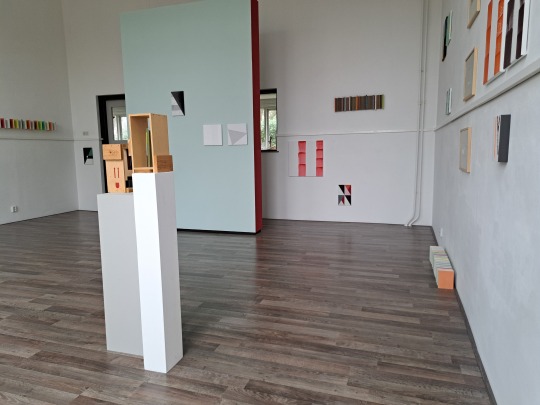
De werken grijpen figuurlijk in elkaar. De sfeer past letterlijk naadloos. Wanneer ik zonder nadenken kijk, mijn kennis uitschakel, merk ik nauwelijks verschil tussen de stijl van Betty Simonides en dat van Frank van Ansem. De composities zijn zo overeenstemmend in gesprek, dat ik mijn stem er niet tussen wil verheffen. Ik houd bij wijze van spreken mijn mond en beleef dit kunstkabinet, dit wonderlokaal, in stilte. Het spel van vlak en lijn, het stoeien met volume en ruimte, geeft al zoveel leven dat ik nauwelijks laat merken dat ik er ben. Verborgen achter mijn beschouwend vermogen kijk ik bedachtzaam rond.
Het werk bekijkt mij met aandacht terug, in belangstelling afwachtend wat ik ervan denk. Wat mijn bevinding is van hun bevestiging dat zij samen deze verbintenis aan kunnen en zijn gegaan. Het heeft ja gezegd en ik beaam dit volmondig. Zelden zag ik zo een eenheid in verschillend werk. Hoewel Kunstlokaal No.8 er een fijne neus voor heeft om tegenstellingen harmonieus samen te brengen. Er zijn in het twaalfjarig bestaan van de galerie al meerdere kunststukjes langs gekomen. De duo’s bleken maar al te vaak door te kunnen voor een solotentoonstelling. Het meervoud was veelal een enkelvoud.
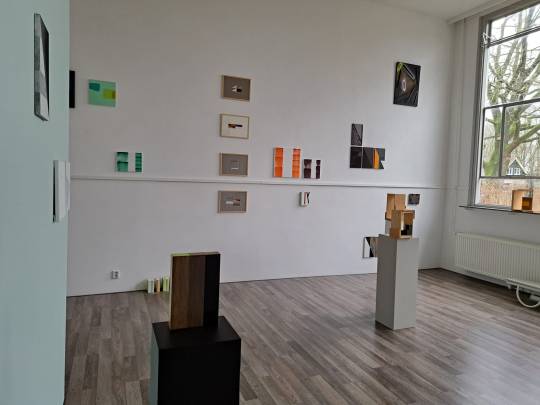
Frank van Ansem speelt gespannen met lijnen en vlakken. Even uitgezet en afgemeten als de ruilverkaveling het land indeelt. Op het scherpst van de snede is het keurig in balans. Evenwichtig recht getrokken en stijlvol ingekleurd. De lijnen trekken de blik de compositie in. Er is experiment in die lijn en dat vlak, maar vooral in de structuur van de drager. Deze wordt niet weg geschilderd, maar blijft zichtbaar als houtnerf en doorbreekt speels de schijnbare zakelijkheid. Het is geen geprogrammeerde AI maar is met warm doorbloede hand gemaakt. Even fantasierijk als de graffiti waar Van Ansem zich voordien mee bezig hield. Beide bezigheden lijken rechtlijnig tegenover elkaar te staan, maar vormen een doorgetrokken lijn in het oeuvre van deze kunstenaar.
Het platte vlak treedt de ruimte in bij de uitgestalde objecten. De uitgestreken lijnen richten zich op, lijken volume te krijgen in de lengte en de breedte. De uitdrukking blijft de abstracte vorm in een kubusachtige entourage. Fragile, maar niet breekbaar, toont het zich in beperkte afmeting robuust en krachtig. Stevig werk, op klein formaat groots. En zo past het zich aan op dat van Betty Simonides. Dat ook geen grootsheid nodig heeft om hoogmoedig te zijn. En geen pretentieuze inspiratie kent om enkelvoudig aan te spreken. Een reeks kleurige kleine rechthoekige panelen aan de wand en op de vloer doen denken aan een rij boeken in mijn kast. Netjes naast elkaar geplaatst op formaat, niets valt uit de toon alsof gerubriceerd op alfabet. Het daglicht vindt er een weg in om al bladerend schaduw te vinden.
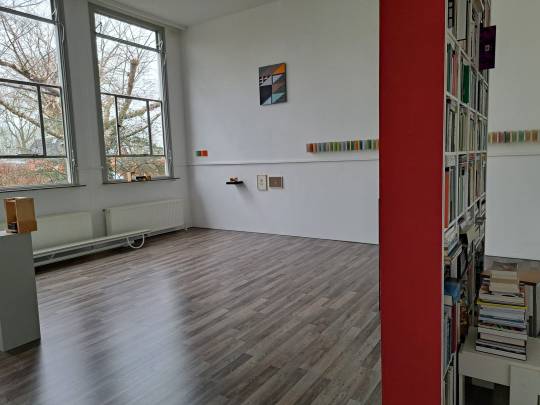
Minimal art is geen arme kunst maar heeft schijnbaar weinig aanknopingspunten nodig. Het werk dat Kunstlokaal No.8 brengt zou je ruwweg onder dat minimalisme kunnen scharen. Betty Simonides heeft hoogstens aan een enkele kleurlijn genoeg om aan te spreken. Of een meervoudige verschuiving van een enkel kleurvlak. De transparante verfstreken, met een brede kwast aangezet, zijn observaties van het materiaal en mijmeringen over de werkwijze. Het werk is bedachtzaam opgebouwd, stijlvol gearrangeerd en doet de compositie kleurrijk klinken. Het is niet alleen de gebruikte materie dat aandacht krijgt, maar meer nog hoe de uitwerking in de ruimte daarop en daarvan is. Op welke manier de kleur van het paneel een kunstwerk maakt en hoe zich dat verhoudt tot het licht dat een scherpe dan wel diffuse schaduw werpt.
Het lijkt op het eerste gezicht een kille tentoonstelling daar in Kunstlokaal No.8. Maar door het speelse spel met kleur, vlak en lijn dat bedachtzaam communiceert met ruimte en licht brengt het een warme sfeer binnen. Een behaaglijke stemming om te genieten van kunst in meervoudige eenvoud. De drempel lijkt hoog voor de minder geoefende kunstbeschouwer, maar is aangepast laag om de figuurlijk gehandicapte kunstliefhebber tegemoet te komen. De kunst in het voormalige schoollokaal is niet moeilijk of minder makkelijk leerbaar ernaar te kijken. De eigenaars willen onderwijzen en laten zien dat kunst vele kijkbare vormen heeft. Alles kan.
Handeling en Ervaring. Werken van Betty Simonides en Frank van Ansem in tentoonstelling bij Kunstlokaal No.8, Schoterlandseweg 55 in Jubbega-Schurega. Tot en met 24 februari 2024.
0 notes